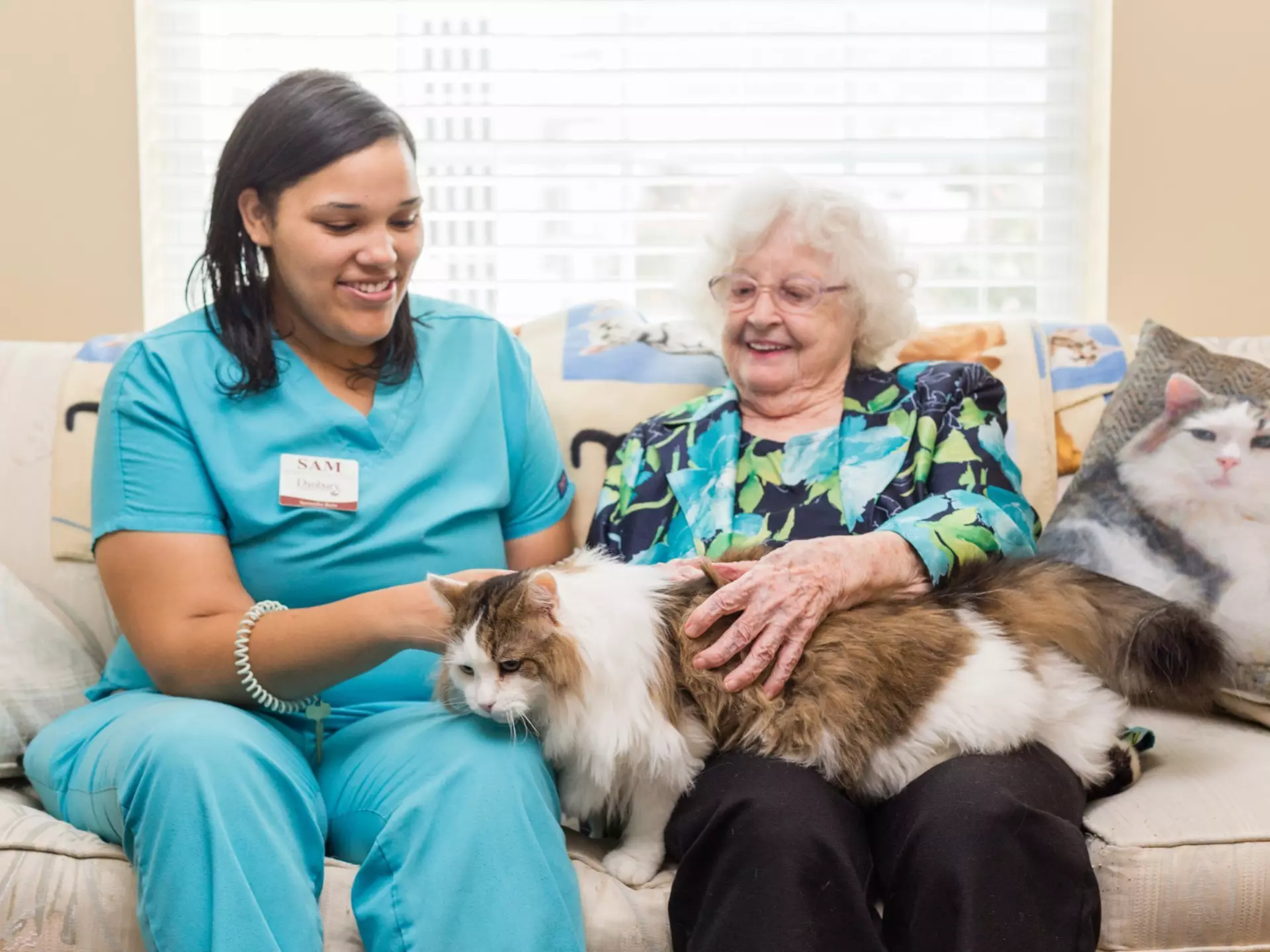As you start looking for an assisted living community, it’s important to ensure it offers the things that matter most to your loved one. If your family member has a special bond with a furry friend or is thinking about getting one, it might be helpful to understand the details involved.
In this blog, we’ll help unpack everything you need to know about owning a pet in assisted living, including common kinds of assisted living pets allowed and some key questions you may ask during your community tour.
Are There Assisted Living Communities That Allow Pets?
One of the first things many families ask when considering a senior living arrangement is: “Are assisted living pets allowed?”
Yes, many assisted living communities are happy to welcome your loved one and their beloved companion. That said, some communities may have stricter pet policies or limitations than others.
Here are some essential things to keep in mind:
- Type of Pet: Many communities have guidelines around the kinds of pets residents can bring. Most welcome smaller pets, so if your animal companion is small and simple to look after, they’re more likely to be accepted. Wild, undomesticated, or exotic animals are generally not allowed due to safety and health concerns. As such, it’s important to ask about pets allowed in the specific assisted living community you’re considering.
- Ability to Keep Up With Pet Duties: Some assisted living communities that allow pets have pet wellness coordinators to help with things like veterinary visits and even help residents arrange for pet walking services. Others may require residents to look after their pets. If that’s the case, it’s important to make sure your aging parent feels comfortable handling these responsibilities.
- Pet’s Behavior and Health: Many assisted living communities may require a pet assessment to ensure your loved one’s pet is a good fit and won’t pose a safety risk to other residents. Some communities also have rules about breed or size. For example, certain breeds that are considered more aggressive, like pit bulls, may not be allowed. If your family member is planning to bring a small animal companion, it will likely need to be well-behaved and up to date on vaccinations.
- Number of Pets Allowed: While most communities allow assisted living with pets, the number of pets a resident can bring may be limited, usually to one or two, to help keep things manageable for everyone.

What Kinds of Pets Are Allowed in Assisted Living?
If you or your loved one hopes to bring a pet to assisted living, there may be some rules depending on the type of animal. Since each community is a little different, it’s a good idea to ask about the specific assisted living pets allowed before moving in.
Here are some of the most common types of pets that are usually allowed, and a few things to keep in mind for each:
Dogs
Most communities welcome dogs, especially smaller breeds. If you or your loved one hopes to bring a dog to assisted living, there may be some rules to follow. Since each community is a little different, it’s a good idea to ask about the specific dog policies and any restrictions before moving in.
However, there are usually some rules, such as:
- Size or Breed Restrictions: Large or strong breeds (like pit bulls or rottweilers) may not be accepted.
- Temperament: Dogs should be calm, friendly, and not prone to barking or jumping.
- Health Records: Most communities will require up-to-date vaccinations and proof that the dog is spayed or neutered.
- Designated Areas: Some communities may require dogs to be on a leash in common areas or specific outdoor areas.
Cats
Cats are a popular companion for seniors who prefer a quieter, more relaxed pet. Since they don’t need to be walked and tend to be relatively low-maintenance, many seniors enjoy the comfort of having a cat in their lap.
Still, most communities may require:
- Proof of vaccinations
- That the cat is litter-trained
- That they are spayed or neutered
Birds
Small birds like parakeets or finches are usually allowed. However, most communities may limit the number of birds you can bring or require that they remain in their cage unless under supervision.
Fish
Fish are considered one of the most calming pets for seniors and are welcomed in many assisted living communities. Plus, they’re generally easier to maintain than most other pets on our list. Each community may have its own guidelines about tank size or maintenance, so it’s often helpful to ask in advance.
Small Caged Animals
Some assisted living communities allow small caged animals, like hamsters, guinea pigs, or rabbits. However, there may be rules about cleanliness, the number of animals allowed, and more.
Reptiles and Amphibians
Some communities may allow small reptiles, like turtles or lizards, but many do not due to health and safety concerns. If your loved one has a reptile companion, it’s important to ask whether it’s allowed in the community ahead of time.

The Benefits of Allowing Pets in Assisted Living
If you or your older loved one has a special bond with a pet, moving into assisted living doesn’t mean you have to leave that connection behind. Many communities welcome pets, and for good reason.
Here are some key benefits of pet-friendly assisted living:
- Companionship: Pet owners usually share a deep bond with their animal companions. Some feel comforted when a dog curls up beside them, while others find peace in the gentle purring of a cat in their lap. For many, having a pet nearby can help provide meaningful companionship and combat feelings of loneliness.
- Natural Stress Relief: Owning a pet may also have health perks! Some research studies suggest petting an animal may help lower blood pressure and reduce anxiety.
- Structured Daily Routine: Looking after a pet can help provide a grounding routine. A senior might wake up to feed their dog, take them on a short walk, and enjoy some quiet time together in the afternoon. These activities can help create some rhythm and a renewed sense of purpose in daily life.
- Boosting Mood: Pets have a special way of cheering people up, especially if you’re an animal lover. Whether it’s the wag of a dog’s tail or the soft nudge of a cat, furry friends often create special moments of joy in a senior’s life.
- Meaningful Way to Connect With Others: Having a pet can open opportunities to make new friends! Whether chatting with neighbors during a walk or bonding with other residents who love animals, pets often help seniors form new friendships with other residents and employees who share their love for animals.
- Encouraging Gentle Movement: Caring for an animal friend can be a meaningful way to get gentle movement throughout the day. Some pet duties may include walking a dog, cleaning a birdcage, or refilling a water bowl. These small movements can help support better flexibility and range of motion, which are particularly useful for older adults.
- Cognitive Benefits: Having a pet can help keep the mind sharp as we age. Research studies have shown that seniors close to their animal companions may experience many cognitive benefits, including better memory, language skills, and overall thinking ability, which tend to naturally slow down as we age.
Key Questions to Ask a Community About Pets
While some assisted living communities happily welcome pets, others may have certain rules or restrictions in place. Before bringing a beloved pet to assisted living, it’s a good idea to learn about your community’s specific pet policy ahead of time.
Here are some helpful questions to ask when touring or speaking with an assisted living community:
- Are pets allowed in your community?
- What types of pets are allowed?
- Are there size or breed restrictions for dogs?
- How many pets can a resident have?
- Are pets required to be spayed or neutered?
- What health or vaccination records are needed?
- Do you require a pet screening or behavior assessment?
- Are there any extra fees or deposits for having a pet?
- Is help available if a resident can no longer manage their pet alone?
- Are pets allowed in common areas or only in private rooms?
- Do you offer any pet-friendly amenities or services?
- What happens if a pet becomes challenging to manage or look after?
What If You Can’t Bring Your Pet?
Sometimes, even with the best intentions, it may not be possible to bring your pet with you to assisted living. Maybe the community doesn’t allow animals, or perhaps health needs make it hard to keep up with pet-related tasks. Letting go of a pet is never easy, especially when they’ve been by your side for many years.
Here are some helpful options you may consider:
- Ask a Family Member or Friend to Help: If you can’t bring your pet with you, consider asking a trusted family member or friend to look after them. It can be comforting to know your pet is safe and loved, even if they’re not living with you. You can also ask your community if they allow pets to stop by on special visitation days.
- Look Into Short-Term Pet Homes or Rehoming Services: If you’re unsure about giving up your pet, consider contacting animal shelters or rescue groups in your area. Many of them offer short-term or long-term foster services. Some may even help pair your pet with a new family who will treat them with the same love and affection.
- On-Site Pets: Some assisted living communities have senior-friendly pets, like cats, birds, or dogs, that residents can pet and spend time with. These animals usually live in the community and are looked after by employees.
How StoryPoint Residents Enjoy Life With Their Pets
At StoryPoint Group communities, we know pets are more than companions — they’re family. Want to meet more of our furry friends? Check out the pets of StoryPoint Group.
Residents like John and his Jack Russel Terrier, Bo, bring warmth and energy to our communities every day. Whether they’re out on a walk or relaxing together in his apartment, their bond reminds us just how meaningful pet ownership can be in assisted living.
Pet-Friendly Assisted Living With StoryPoint Group Communities
At StoryPoint Group communities, we understand the profound joy that a furry companion can bring, especially for older adults. For lifelong pet owners, the thought of parting with their beloved pet can feel truly heartbreaking. That’s why many of our communities are proud to welcome residents and their animal friends — so they can continue their journey side by side.
If you or a loved one could benefit from assisted living or another type of support, we’re here to help guide you through the next steps.
To learn more, call 1-844-275-9990 or schedule a tour at a StoryPoint Group community near you. We can’t wait to welcome you and your pet pal!













